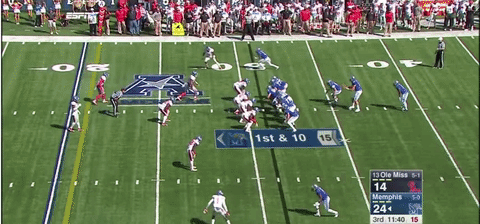The NFL is not a patient business. The average tenure of an NFL coach is not unlike the life span of a mayfly; non-guaranteed contracts allow organizations to cut bait with players the minute they don’t perform, or at least force them into taking a pay cut. In a league with only 16 regular season games and more money at stake than ever, the pressure to win — and to win right now — is tremendous.
Which brings us to the Denver Broncos quarterback situation. The Broncos were forced to scramble after Peyton Manning’s presumed successor, Brock Osweiler, fled for greener grass in Houston. They responded by trading for Mark Sanchez and selecting Paxton Lynch in the first round of April’s draft.
As soon as the Broncos picked Lynch, NFL media types began spouting off some version of the same thing: Lynch might be really good, but he needs time to develop. The question is are the Broncos willing to give Lynch that time even if they’re losing? Can an organization that hasn’t known anything but division titles and Super Bowl appearances since John Elway moved into the front office exercise patience? Those answers could determine how the rookie QB’s career shakes out.
To understand why so many believe Lynch needs time to get acclimated to the pro game, you must look at the uncommon path he took to get to the NFL. Lynch is a relative newcomer to the quarterback position — he didn’t start playing it until high school — and he’s also got about as much experience in a pro-style offense as you or me.
Most NFL quarterbacks were groomed to play the position in grade school. The 15 quarterbacks taken in this year’s NFL Draft first played QB at an average age of 9 years old, according to Robert Klemko of the MMQB. Lynch, who moved there as a high school freshman, is clearly an outlier in that regard. And even when Lynch did start playing QB, it was in a weird situation. His small private high school in Deltona, Florida, ran the Wing-T offense, an attack that emphasizes misdirection and running plays. It’s an offense you use when your quarterback’s a 5-foot-7 kid with a noodle arm, not a 6-foot-7 giant with a cannon.
Lynch was finally unleashed at Memphis. He shot up draft boards last season as a junior after displaying exceptional athleticism and showing off his rocket right arm. He finished the season with 3,788 passing yards, 28 touchdowns and four interceptions.
The highlight of Lynch’s season came in mid-October against an Ole Miss team ranked No. 13 at the time. Lynch eviscerated a Rebels defense loaded with future pros. He finished with 384 passing yards and three TDs in a 37-24 win. All of Lynch’s physical gifts were on display that day. The ability to extend plays with his feet? Check. Exceptional athleticism for a guy his size? Yep. Good arm strength? Uh huh.
Check out Lynch’s first TD pass of the day. Lynch — lining up under center for once, instead of in the shotgun — fakes a handoff, rolls out to his right and evades an edge rusher for what seems like an eternity before throwing a perfect strike.
Six-foot-seven human beings should not be able to make this play! Lynch is far more athletic than Osweiler, the supersized QB who took snaps for the Broncos last season. This play is an example of why Lynch projects as a good fit in Gary Kubiak’s offense, which relies on play-action passes and rollouts that complement the running game.
Lynch can move; of that there is no doubt. Watch him again fake the hand off here then throw a 31-yard bomb for a TD.
He can make some ridiculous throws, especially when he steps into them. The problem is Lynch’s footwork is spotty at times. (See: Lynch’s 16-for-37, 106-yard performance against Auburn in the Birmingham Bowl.) Lynch was a good enough athlete to get away with a lot of throws standing flat-footed or leaning back most of the time in college. But it’s doubtful he’ll be able to have similar success in the NFL, where the athletes are bigger and stronger and the margin for error is razor-thin.
What the Broncos’ first-round selection needs is time. Time to learn. Time to grow. Time to develop good habits before he gets thrown into the fire. How could Lynch not? He didn’t play QB until years after most of his peers started to. He ran a gimmick offense in high school, and in college he operated almost exclusively in the spread. It’s only natural that Lynch is still mastering the minutiae of the position.
Lynch has the physical tools to grow into a good NFL quarterback. He just needs to be brought along slowly. Will the Broncos have the necessary patience if they start 0-3 or 1-4 with Mark Sanchez in the starting role? Only time will tell.












